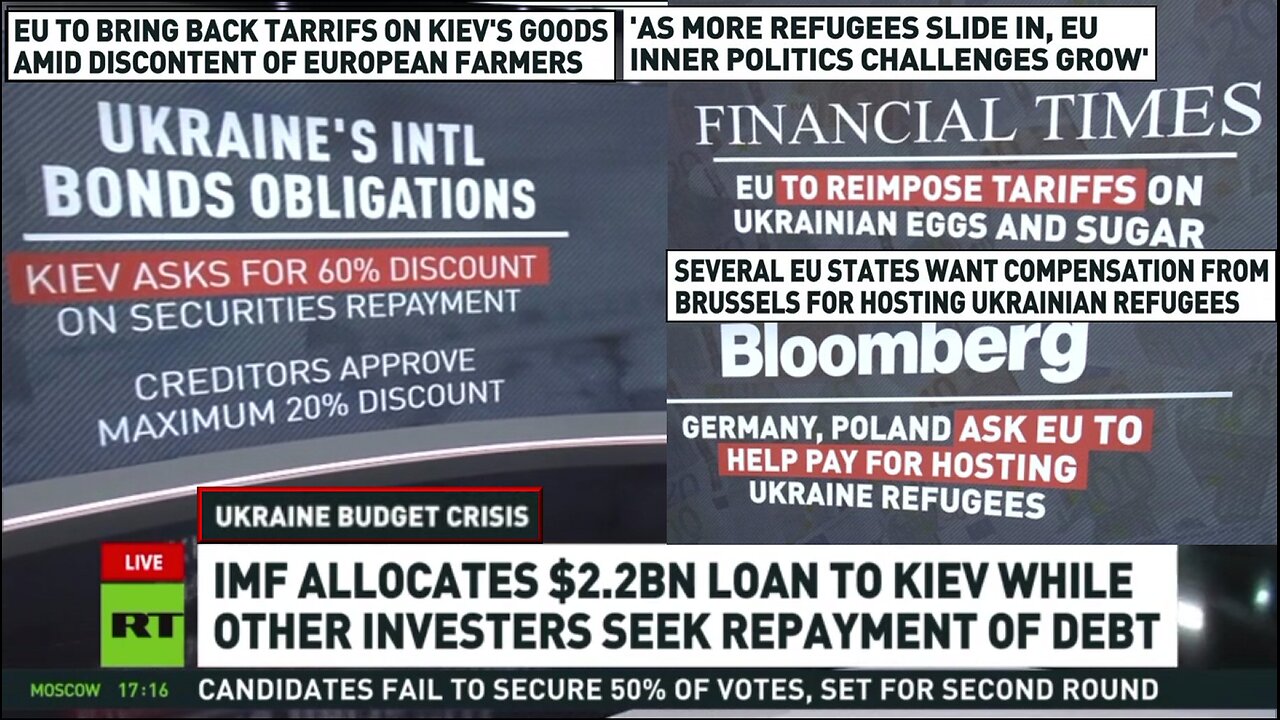Premium Only Content

RT News - June 29 2024 (late) Belgrade (Serbia) Israeli embassy attack.
In Belgrade, Serbia, a policeman has come under terrorist attack whilst guarding the Israeli embassy, the assailant used a cross-bow. The attacker was shot and died on the spot. The policeman was hit in the neck with an arrow but is recovering in hospital. The terrorist is thought to be Wahhabi.
----
The Iranian mission to the UN has warned of an obliterating attack on Israel if the IDF continues to strike Lebanon. Maria Finoshina reports from Haifa. Please see today's earlier video post for more details. Use "show more"
----
Ukrainian attacks on three Russian regions have killed five and wounded six more in the past 24 hours. In Kursk, five people have died. Attacks on Belgorod and Donetsk residential properties and shops have injured others and caused serious damage. The head of Rilsk District, Andrey Belousov issued advice/warning to residents. Warning: sensitive images. Russia has retaliated, more than 1,800 Ukrainian troops and critical defences have been taken out. An ammunition shed was also destroyed.
----
Ukraine's finances: $2 billions of IMF aid has been allocated to Ukraine but external fund managers are insisting that in August, loans and bond obligations must be met. There is approx 50% shortfall on what Ukraine can pay. This comes as the EU is set to impose tariffs on Ukraine's produce (see https://rumble.com/v531g74-rt-news-june-22nd-2024-early.html?start=93 for details)
Some EU states are calling for support to help with Ukraine's refugees. Olaf Scholz has said all countries must contribute to their upkeep equally, via the EU. International Security Consultant Earl Rasmussen comments.
----
The US "Presidential debate" (everyone is still talking about it, the MSM are having a field-day) comments by RT's Steve Sweeney.
----
Mali : In Brussels, Adboulaye Dip, Mali's Foreign Minister said "We will move forward with or without you [Europe/the West]" Earlier in Burkina Faso, the Sahel Alliance said they want partnerships with sincere countries only. Analysis from Angelo Giuliano.
Below: 1) EU extends sanctions against Russia’s closest ally
2) FEATURE ‘It all came from the West’: Who is behind the golden age of terrorism in the Middle East?
3) Putin open to resume production and deployment of intermediate-range missiles
4) ANALYSIS: Why does a NATO member suddenly want to join BRICS?
Short take: Iran’s presidential race heads to a run-off. With reformist, Masoud Pezeshkian and conservative Saeed Jalili set to face-off next week. Deadly Ukrainian shelling on Russian border region results in civilian fatalities, with several residential buildings, shops and a temple damaged in the attacks. The New York Times calls for Biden to quit the presidential race after a calamitous debate performance reinforcing speculation that Democrats have planned all along to put forward another candidate. The Malian foreign minister shares some hard truths in Brussels, as the Sahel alliance expands to new fronts of co-operation with Russia and China.
==================================
1) EU extends sanctions against Russia’s closest ally 29 Jun, 2024 15:56
The measures targeting Minsk mirror some of those taken against Moscow, and are expected to address attempts to evade the restrictions
The Council of the European Union has introduced a new package of sanctions against Belarus. The measures echo a number of restrictions that Brussels had previously introduced against Russia.
The move is expected to make EU sanctions against Russia more effective by addressing the circumvention of existing anti-Russian restrictions, according to a statement released by the council on Saturday.
“The close integration of the Russian and Belarusian economies has substantially facilitated the circumvention of existing sanctions against Russia,” the statement reads. “This new set of sanctions against Belarus mirrors several of the measures already imposed on Russia, making EU sanctions against Russia more effective.”
The new set of measures bans the direct or indirect imports of gold and diamonds from Belarus, along with helium, coal and mineral products, including crude oil. It also prohibits exports of goods and technologies “suitable for use in oil refining and the liquefaction of natural gas.” Exports to Belarus of maritime navigation goods and technologies as well as luxury items are now also barred.
Brussels has also broadened the ban on the transport of goods by roads within the territory of the bloc by trailers and semi-trailers registered in Belarus, including those hauled by trucks registered outside the country. Providing a wide range of services to Belarus, its government, public bodies, corporations, agencies, and citizens has been banned by the latest measure as well.
The EU Council stressed that the move comes in response to support that the Belarusian government allegedly provides to Moscow amid the ongoing military conflict in neighboring Ukraine.
After the launch of Moscow’s military campaign against Ukraine, Brussels ramped up sanctions against Belarus, citing its involvement in the conflict. While the measures were much more lenient than the ones targeting the Russian economy, the EU still banned the export of dual-use goods and technology to Belarus, as well as a wide range of industrial products, while targeting the country’s financial sector. Both Belarus and Russia have denounced the sanctions as illegal.
Belarusian officials had previously said they are trying to mitigate the impact of the sanctions by altering customs legislation and organizing complex logistical chains. Earlier this year, lawmakers in Minsk passed a bill allowing the legal sale of sanctioned goods that are marked as being in transit.
https://www.rt.com/russia/600194-eu-extends-sanctions-belarus-russia/
===============================
2) FEATURE ‘It all came from the West’: Who is behind the golden age of terrorism in the Middle East? 29 Jun, 2024 11:16
Ten years ago, ISIS declared the creation of an Islamic caliphate. Although the terrorists were defeated, the threat lives on
At its peak, ISIS controlled one third of Syria and about 40 percent of Iraq. Various groups in Africa pledged loyalty to its leader, and cells of the organization carried out attacks in the heart of Europe. Various actors, local, regional and international, exerted efforts to curb the spread of the cancer but today their radical ideas persist.
Sheikh Mohammed al-Tamimi still remembers June of 2014, when Abu Bakr al-Baghdadi, the then-leader of ISIS, a Sunni terrorist group, announced the establishment of a caliphate stretching from Aleppo in Syria to Diyala in Iraq.
In those days, Al-Tamimi was a commander in the Faylaq al-Wa’ad al-Sadiq forces, a Shiite militia linked to Iran that was originally established to defend Iraq from American and British occupation in 2003 but was later developed into a force fighting to secure Iraq and neighboring Syria from the threat of ISIS.
In 2014, Al-Tamimi participated in many battles, where he and his fighters faced off against the ISIS terrorists.
In June 2014, for example, he undertook his first air descent operation at Speicher Airbase in Salah Al Din province with the aim of saving a group of commanders, officers and fighters who were besieged in the area – a task he and his 250 fighters successfully accomplished. Later that same month, he led an operation to free hundreds of hostages at Tikrit University. His men wouldn’t rest until the last ISIS terrorist was eliminated.
“Those were really sad days,” recalls Al-Tamimi. “Terrorists were seizing control over large parts of the four Sunni provinces, and quickly advancing thanks to the support of sleeper cells and the backing of the Sunni Muslim community.”
The beginning of the nightmare
In 2003, after the US invasion of Iraq, Sunni Muslims, a national minority who had enjoyed a privileged status under Saddam Hussein, started to be persecuted. The new, Shiite government discriminated against the Sunnis in everything from bureaucracy and politics to business and security jobs, leading to frustration and general dissatisfaction. When ISIS came and vowed to change all that, many Sunnis extended them a helping hand.
Al-Tamimi says ISIS managed to sell them a dream. “Their idea was to overthrow the political systems in Iraq and Syria to establish a Sunni caliphate. Their clerics issued fatwa [religious rulings - ed.], calling to eradicate anyone who would not go by their fanatical teachings. Those fatwas came from Saudi Arabia, and were supported by Qatar. Money, arms and fighters were streaming from the West. Everything was going according to plan,” he explains.
By September 2014, ISIS already controlled most of Iraq’s northwest. Large parts of Syria - that since 2011 had been fighting various armed groups, were also under its control. There too, ISIS was bolstered by local Sunni tribes who were frustrated by long years of dry seasons, dire economic conditions and the negligence of the Syrian government.
Lamis Jdid, a researcher of international relations and a native of Aramo, a tiny village in the Governorate of Latakia, some 30 kilometers away from the Mediterranean, describes how the life of her community was shattered when ISIS started taking over.
“In August 2014, twenty armed groups belonging to the Syrian opposition, comprised of ISIS, Ahrar al-Sham, Al-Nusra and others, launched an attack on many villages close to the northern Turkish border, including Aramo. They killed 190 people and took 240 others into captivity. Most of those were women and children.”
“They destroyed holy places and harassed minorities. All of us were terrified by their presence. My family that still lives in Latakia did not dare to go to the village or take the road to Damascus. Such a trip could cost an Alawite their life. My Christian friends had to cover their heads when moving from city to city, out of fear of being stopped and attacked by ISIS groups.”
The Syrian Army, which was forced to fight multiple radical groups simultaneously, needed to prioritize. Its efforts were primarily focused on two axes: Damascus-Homs-Hama-Aleppo and Hama-Tartus-Latakia. Small cities and towns, especially on the outskirts, fell prey to ISIS gangs.
Then, their threat started to spill over, far beyond the borders of the Middle East. In Africa, many small terror groups started pledging loyalty to Abu Bakr al-Baghdadi, the then-leader of ISIS. Europe was shattered by several terror attacks carried out by the group’s loyalists.
Who finished this?
Action was necessary. In September 2014, the US established a Combined Joint Task Force – uniting 87 Western and Eastern partners – to fight the threat of ISIS. During the first five years of its existence, the alliance pounded Syria and Iraq with thousands of bombs. It killed hundreds of ISIS terrorists and detained thousands of others. In 2019, after Al-Baghdadi was eliminated, the US and their allies claimed victory in the fight against ISIS. But Al-Tamimi says it wasn’t the US that helped stop the threat of ISIS.
In June 2014, a Shiite leader, Sayyid Ali al-Husseini al-Sistani, issued a fatwa calling on the Shiites in Iraq to rise in defense of their motherland from the hordes of ISIS invaders. Thousands rose to the occasion, forming the so-called Popular Mobilization Forces (PMF), an alliance of 67 armed factions boasting some 100,000 fighters.
“This was the force that blocked the advancement of ISIS,” says Al-Tamimi. “Iranians also played a pivotal role, as they provided advisors and weapons. Russians came to the rescue too, supplying support to the Iraqi government and the PMF. The Americans, on the other hand, were the ones who supported terror groups, feeding them with weapons and military equipment. Holders of European passports were fighting in the ranks of ISIS; money was flowing from the West,” he added.
Ali Yahya, a political analyst and international affairs advisor based in Beirut, knows well the history of ISIS, and he agrees with the claims put forward by Al-Tamimi.
“It is not the first time that the US is stealing victory and changing the narrative,” he says. “The Red Army was the main power that eliminated Nazism, whereas Washington waited until June 1944 to open a front. Nevertheless, they claimed victory in that war, sidelining the achievements and the sacrifices of the Russians. It is true in the case of ISIS as well.”
According to Yahya, in 2014 the Iraqi government approached the US asking to supply them with the weapons they needed to fight the ISIS insurgency. The Americans agreed but said that the first shipments would only arrive in 2020 - a luxury Baghdad could not afford. When the Iraqis understood Washington‘s terms, they quickly turned to Iran and Russia for help, and they delivered.
“It was thanks to them that Iraq started to gradually break ISIS. When the Americans came to the realization that the Iraqi forces would soon destroy the group, they joined forces in the final battle of Mosul so that later on, they could claim victory over the organization.”
More blood in the future?
That victory was proclaimed in 2019, but even after ISIS lost most of its territory, the allies of the Joint Task Force continued to carry out attacks in Syria and Iraq, under the pretext of fighting terror. Al-Tamimi has been fighting the Americans, demanding that they leave his country.
“Today, thanks to the efforts of our heroes and the supreme religious authority, Iraq is capable of eliminating any terror organization. Iraq is under the control of the state. ISIS is now a thing of the past, it cannot make its way back to Iraq,” he claims.
Statistics, however, paint a different picture. According to US Central Command data released in January 2024, ISIS still boasts some 2,500 militants in Iraq and Syria, of whom about 1,000 are at large in Iraq. A non-profit group called the Counter-Extremism Project reported that there were at least 69 ISIS attacks in Syria in March alone.
“The problem with fanatics is that it is not an organization, it is an idea. So how can you possibly destroy it?” asks Jdid.
“Of course there should be a security arrangement in the whole region to weaken those groups. But we also need to think about educational, social and economic solutions to eradicate terror. In Syria this could be empowering secular education, separating religion from state and fighting corruption,” she concluded.
By Elizabeth Blade, RT Middle East correspondent
https://www.rt.com/news/600153-isis-middle-east-terrorism/
================================
3) Putin open to resume production and deployment of intermediate-range missiles 28 Jun, 2024 20:53
Russia’s president is reviewing the weapons in response to US actions following the collapse of the INF treaty
Russia could resume the production and global deployment of ground-based intermediate and shorter-range missiles, President Vladimir Putin has said.
Munitions of this type were originally restricted by the Intermediate-Range Nuclear Forces Treaty (INF), which collapsed back in 2019, yet Russia opted neither to produce nor deploy such weaponry even after the demise of the cornerstone agreement with the US.
The president made the remarks on Friday during a meeting with permanent members of the country’s Security Council. Hostile actions by the US now require Moscow to review its stance on the INF-covered weaponry, Putin told the gathering.
“Today, we will review the steps Russia should take regarding the unilateral moratorium on the deployment of ground-based intermediate- and shorter-range missiles,” Putin stated.
Moscow has lived by its promise to “neither produce these missiles, nor deploy them as long as the United States does not deploy such systems anywhere around the globe” following the collapse of the treaty, Putin noted. However, the situation has changed, with Washington deploying such missiles overseas, the president said.
“We now know that the US is not only producing these missile systems, but has also brought them to Europe, Denmark, to use in exercises. Not long ago, it was reported that they were in the Philippines. It is unclear whether they have taken these missiles out of the Philippines or not,” Putin explained.
Russia now needs to “respond to this and decide on our further steps in this regard,” Putin stressed, suggesting the resumption of intermediate- and shorter-range missiles was actually the only option for the country.
“It appears that we need to begin producing these attack systems and then, based on the actual situation, decide on where to deploy them to ensure our security, if necessary,” he said.
The landmark 1987 INF Treaty banned both the US and Soviet Union (and its successor, Russia) from producing and fielding ground-based ballistic and cruise missiles, as well as their respective launchers, with ranges of 500 to 5,500 km (310 to 3,420 mi). The treaty did not affect air- or sea-based systems with the same range.
The cornerstone deal collapsed in 2019 under the Trump administration, with the US accusing Moscow of grossly violating it. However, it provided no solid evidence to back up the claims. Russia has been raising concerns over Washington’s actions and potential violation of the deal for years already, pointing at the elements of the so-called missile defense network deployed in Europe, which are likely compatible with ground-strike missiles rather than only anti-aircraft ones.
https://www.rt.com/russia/600179-putin-intermediate-range-missiles/
===========================
4) ANALYSIS: Why does a NATO member suddenly want to join BRICS? 29 Jun, 2024 15:26
There are benefits and drawbacks to Türkiye potentially joining the bloc of emerging economies
At the beginning of this month, news of Türkiye’s desire to join BRICS drew global media attention. The announcement was made by Turkish Foreign Minister Hakan Fidan during his visit to China. “Of course, we would like to become a member of BRICS. Let’s see what we can achieve this year,” said the minister, as quoted by the South China Morning Post.
This issue was also discussed at the BRICS foreign ministers’ meeting in Nizhny Novgorod, attended by Türkiye’s chief diplomat, Hakan Fidan. Türkiye’s desire to join is not entirely new – during the BRICS summit of 2018, where Turkish leader Recep Tayyip Erdoğan was a participant, Russian President Vladimir Putin said Ankara could join in 2022. However, subsequent events on the world stage apparently delayed that ambition, and Ankara is only now showing renewed interest.
What is BRICS?
BRICS is an international association initially comprising five major developing economies: Brazil, Russia, India, China, and South Africa. Established to enhance cooperation and strengthen global positions, its name comes from the initial letters of member states’ names.
The concept began in 2001 when Goldman Sachs analyst Jim O’Neill coined “BRIC” for the fastest-growing major economies at the time: Brazil, Russia, India, and China. The first formal meeting occurred in 2006 at the UN General Assembly. The first BRIC summit was held in Yekaterinburg in 2009. South Africa joined in 2011, making it BRICS. As of January 1, 2024, Egypt, Ethiopia, Iran, Saudi Arabia, and the UAE have also joined.
BRICS aims to promote economic growth, strengthen trade and investment, develop infrastructure, and maintain financial stability through mechanisms like the New Development Bank (NDB) and Contingent Reserve Arrangement (CRA). It seeks greater roles in international institutions such as the IMF and World Bank. BRICS also focuses on scientific and technical cooperation in energy, medicine, and agriculture.
The association strengthens economic ties, contributing to mutual development and trade. By providing alternative funding sources, it reduces dependence on Western financial institutions. BRICS countries work together to defend their interests and promote a more equitable global order. They also address global challenges like climate change and pandemics.
BRICS is unique due to its diverse membership spanning different continents and cultures. Without rigid legal frameworks, it allows flexible action focused on practical cooperation and specific projects to improve citizens’ lives. This attracts more non-Western countries to join the association.
BRICS vs G7
With the confrontation between the countries of the global majority and the West growing, BRICS is considered to be emerging as an alternative to the G7. This is determined by several key reasons related to economic, political, and social aspects. The G7, comprising leading economically developed countries – the US, Canada, the UK, France, Germany, Italy, and Japan – has traditionally dominated the international arena, shaping the global economic and political agenda. However, the emergence and development of BRICS have changed this balance, offering an alternative view on global governance and cooperation.
BRICS unites the largest developing economies in the world, which together account for a significant share of global GDP and population. Collectively, BRICS countries possess vast resources and potential for economic growth, making them important players on the global stage.
To provide a clearer understanding, let’s compare some indicators. With its five new members, BRICS now accounts for almost 34% of the world’s land area, while the G7 accounts for 16%. BRICS countries are home to 45.2% of the world’s population, compared to just 9.7% in the G7. The combined GDP based on purchasing power parity in BRICS countries is 36.7% of the global total as of 2024, compared to 29.6% for the G7. Data on oil reserves show that BRICS countries now hold 45.8% of global volumes, while the G7 holds only 3.7%.
Thus, in many respects, BRICS surpasses the G7. The economic power of BRICS allows these countries to propose alternative models of development and economic cooperation, differing from the Western approaches represented by the G7.
Due to international contradictions and the destructive hegemony of Western countries led by Washington, questions about the need to transform the world order are actively arising. BRICS advocates for a multipolar world, where the balance of power is more evenly distributed among various regions and countries. While the G7 represents the interests of economically developed Western powers, BRICS focuses on the issues and interests of developing nations, which are often marginalized in global politics. This makes BRICS an important platform for countries seeking greater autonomy and independence from Western influence.
Moreover, the creation of the New Development Bank (NDB) and the Contingent Reserve Arrangement (CRA) demonstrates the BRICS countries’ desire to establish alternative financial institutions capable of competing with traditional Western institutions, particularly the IMF and the World Bank. These new mechanisms allow BRICS countries and other developing nations to obtain financing on more equitable terms and with fewer political conditions.
BRICS actively develops cooperation in fields such as science and technology, education, healthcare, and the environment. These initiatives aim to improve the quality of life for citizens of member countries and address global challenges such as climate change and poverty. Unlike the G7, which focuses on issues relevant to developed countries, BRICS places particular importance on the problems faced by developing nations.
BRICS represents a broader spectrum of cultures and regions than the G7, making it a more inclusive and representative organization on the global stage. This diversity allows BRICS countries to consider different perspectives and needs, promoting a fairer and more balanced approach to solving global issues.
This explains the interest of many countries in becoming part of the association. To date, almost 30 countries have expressed a desire to become full members of the association or to gain partner status. These include Azerbaijan, Algeria, Bangladesh, Bahrain, Belarus, Bolivia, Venezuela, Vietnam, Honduras, Zimbabwe, Indonesia, Kazakhstan, Cuba, Kuwait, Morocco, Nigeria, Nicaragua, Pakistan, Senegal, Syria, Thailand, Türkiye, Uganda, Chad, Sri Lanka, Equatorial Guinea, Eritrea, and South Sudan. However, only some countries from this list have officially applied for membership: Algeria, Bangladesh, Belarus, Bolivia, Venezuela, Zimbabwe, Pakistan, and Thailand.
Thus, BRICS plays a significant role in modern global politics and economics, contributing to the development of multilateral cooperation and strengthening the positions of developing countries on the global stage.
Why Does Türkiye Want to Join BRICS?
Türkiye shows significant interest in joining BRICS, seeing it as an important step toward enhancing its international influence and economic potential. This aspiration is driven by several key factors related to economic, political, and geostrategic aspects.
Possessing one of the largest economies in the region, Türkiye aims to diversify its economic ties and strengthen cooperation with rapidly developing countries. Joining BRICS would give Ankara access to a vast market and opportunities to increase trade and investment with the leading economies of the developing world. This is especially important in the context of global economic challenges and uncertainties, where diversifying partners becomes a key factor for sustainable growth.
Türkiye has repeatedly faced financial difficulties and restrictions imposed by Western financial institutions such as the International Monetary Fund (IMF) and the World Bank. Joining BRICS would provide Türkiye with access to the New Development Bank and the Contingent Reserve Arrangement, allowing it to secure funding on more favorable terms and with fewer political commitments. This is particularly relevant for Türkiye, which seeks to maintain its economic independence and minimize external pressure.
Türkiye actively supports the idea of a multipolar world, where the balance of power is more evenly distributed among various regions and countries. BRICS, advocating for multipolarity and fair global governance, represents an attractive platform for Türkiye, which strives to enhance its political independence from Western countries and blocs such as the European Union and NATO.
In this context, it is also worth noting that Ankara views its desire to join BRICS as a gesture towards the EU, a bloc it once sought to join. This is confirmed by the words of Turkish Foreign Minister Hakan Fidan. During his visit to China, he noted that some European countries oppose Türkiye’s accession to the EU, and thus Turkish authorities see BRICS as an alternative platform for integration. “We cannot ignore the fact that BRICS, as an important cooperation platform, offers some other countries a good alternative. ... We see potential in BRICS,” he explained.
Türkiye’s geographic location makes it an important link between Europe, Asia, and the Middle East. Joining BRICS would strengthen Türkiye’s geopolitical position and enable it to effectively use its strategic location to advance its interests and strengthen ties with other member countries. This would also contribute to enhancing Türkiye’s role in regional and global security.
Membership in BRICS would significantly strengthen Türkiye’s international influence and prestige. Türkiye would be able to participate in the development of global economic and political strategies, offering its ideas and solutions to address global problems. This would bolster Türkiye’s positions on the world stage and facilitate its more active participation in international organizations and forums.
Türkiye seeks to join BRICS for several reasons, including economic development, access to alternative financial institutions, political independence, geostrategic interests, and the enhancement of international influence. Joining BRICS would open new opportunities for Türkiye, strengthen its positions on the global stage, and ensure more balanced and equitable participation in world affairs. Membership in BRICS would enable Türkiye to play a more active role in international affairs and contribute to the creation of a more balanced global system.
Barriers to Türkiye’s Entry into BRICS
Although Türkiye’s entry into BRICS could bring significant benefits to Ankara, there are serious barriers that complicate this process. These barriers include domestic political realities, economic challenges, and external pressure from the West.
The domestic political situation in Türkiye creates significant obstacles to joining BRICS. The ruling Justice and Development Party (AKP), founded by President Recep Tayyip Erdoğan, for the first time in 22 years lost to the opposition in municipal elections held on March 31 this year. The Republican People’s Party (CHP), which traditionally supports pro-Western positions, gained control over 35 cities, while Erdoğan’s party succeeded in only 24 cities.
The CHP’s victory in the municipal elections indicates a shift in Ankara’s political direction toward the West. Even within the AKP, there are proponents of closer ties with the West, complicating the decision to join BRICS. The deputy chairman of the Turkish party VATAN (“Homeland”), Hakan Topkurulu, noted that Türkiye should join BRICS but also acknowledged the presence of a strong pro-Western group in Türkiye, connected with NATO membership since 1952. These groups are part of all political parties and exert significant influence on the government, creating an internal conflict between Atlanticist and Eurasian-leaning forces.
Türkiye has close military and economic ties with Western countries, making the question of joining BRICS even more complex. Türkiye’s decision to become a BRICS member could provoke strong pressure from Washington and its Western allies, who see BRICS as a threat to their dominance on the international stage. This could manifest as sanctions, economic restrictions, and political pressure, negatively affecting the Turkish economy and its international relations.
The economic situation in Türkiye also presents a serious barrier to joining BRICS. The country’s economy is in a dire state, and high inflation forces economic authorities to seek investments. Currently, Türkiye relies more on the West in this regard, as BRICS countries are mainly developing economies themselves and cannot offer such significant investments.
Although BRICS countries have great economic potential, they face their own internal economic problems and may not always provide the necessary financial support to Türkiye. This makes joining BRICS less attractive to Türkiye from an economic standpoint, especially in the short term.
Thus, despite the potential benefits of joining BRICS, Türkiye faces several serious barriers. Domestic political realities, including the influence of pro-Western forces and internal disagreements, create significant obstacles to the decision to join BRICS. External pressure from the West and close economic ties with Western countries further complicate this process. Finally, the economic challenges Türkiye faces make seeking investments in the West more attractive than the possibility of joining BRICS. All these factors together create a complex and multi-layered picture that hinders Türkiye’s intentions to become part of BRICS.
However, in the long term, BRICS membership opens new opportunities for Türkiye, and considering the transformation of the global order, it could allow Ankara to secure a strong position in the future. Thus, Türkiye will weigh all the pros and cons, striving to extract maximum benefit for itself. It would not be surprising if Turkish authorities decide to join BRICS, as this aligns with Erdoğan’s paradigm of conducting a sovereign foreign policy in the interest of his country.
By Murad Sadygzade, President of the Middle East Studies Center, Visiting Lecturer, HSE University (Moscow).
https://www.rt.com/news/600171-turkiye-nato-brics-membership/
===============================
-
 28:41
28:41
Professor Nez
7 hours ago🚨BLOOD on their HANDS! The Man Biden & Kamala Flew In Finally Faces JUSTICE for Laken Riley
469 -
 LIVE
LIVE
Game On!
12 hours ago $3.21 earnedRussell Wilson MVP? TNF Steelers vs Browns Game of the Year!
1,415 watching -
 13:57
13:57
This Bahamian Gyal
13 hours agoSo, now MIKA and JOE want to work with HITLER? Sunny Hostin was right!
14.8K28 -
 59:38
59:38
The Tom Renz Show
15 hours ago"MAGA & Unity With Pastor Bernadette Smith"
8.34K1 -
 2:12
2:12
Memology 101
12 hours ago $2.35 earnedTYT's Cenk Uygur DESTROYS deluded self-proclaimed election Nostradamus over FAILED prediction "keys"
8.09K9 -
 2:11
2:11
BIG NEM
13 hours agoMeet the NATIVE Tribe Of The Balkans Nobody Talks About
4.94K2 -
 2:40:31
2:40:31
Fresh and Fit
11 hours agoAre You Smarter Than A 5th Grader? After Hours
185K70 -
 4:07:42
4:07:42
Alex Zedra
17 hours agoLIVE! Scary Games with the Girls
164K6 -
 22:35
22:35
DeVory Darkins
13 hours ago $27.93 earned"Don't Call Me Stupid!" Election Guru HUMILIATED by Left Wing Host
73.6K76 -
 1:41:14
1:41:14
Megyn Kelly
15 hours agoMace's Quest to Protect Women's Spaces, and RFK vs. Media and Swamp, w/ Casey Means and Vinay Prasad
83.4K116